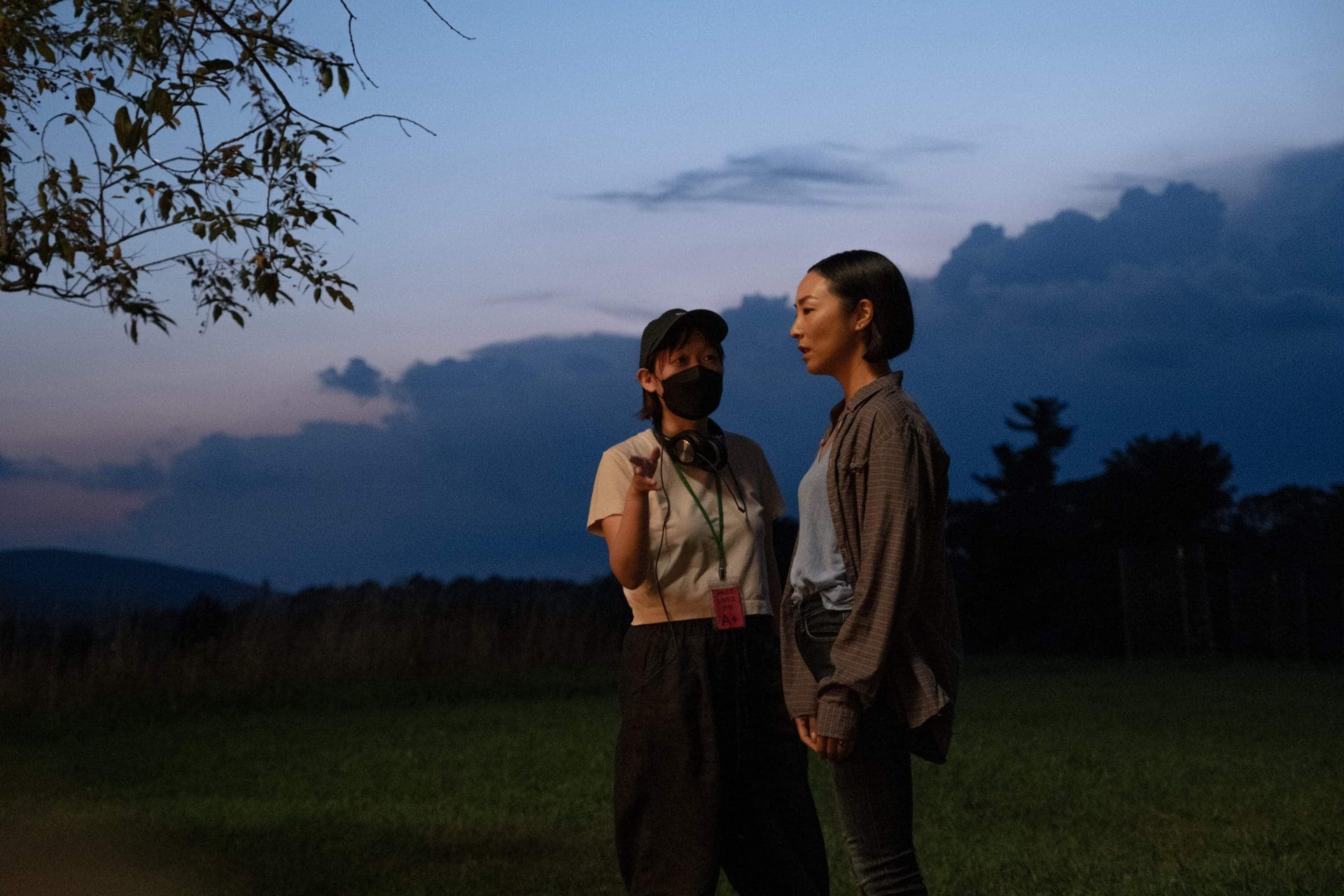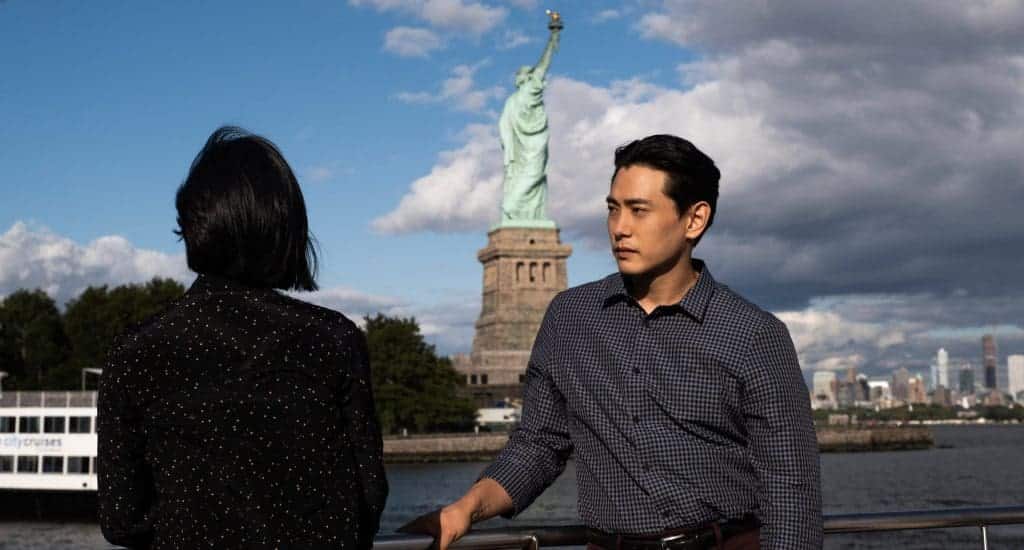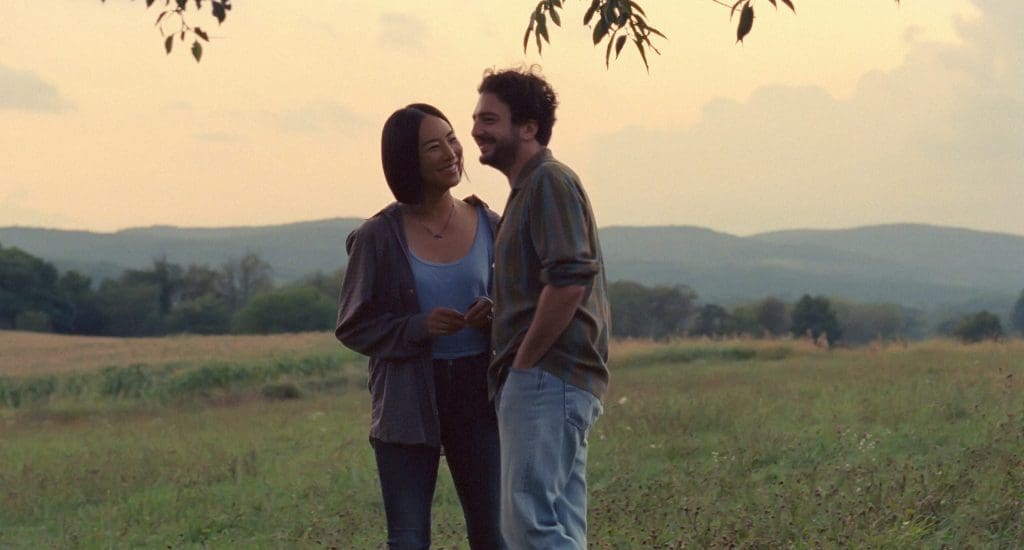
As part of our special series 12 Days of Christmas, below you can listen to our Features Writer Luke Georgiades speak to Celine Song about Past Lives.
Celine Song has picked a particularly good day to visit London. It’s one of those rare British mornings that dares live up to the summer promise of clear skies and sunshine, and when I meet Song at the StudioCanal offices, the Korean-Canadian filmmaker, busy gearing up to premiere her monumental debut Past Lives at Sundance London, greets me with a similar warmth. At this point, it would be an understatement to say that Past Lives has been having a good run, already bringing the house down at Sundance’s American counterpart way back in January and subsequently being hailed by critics and audiences alike as an early best of the year. I dare you to watch and disagree. A quiet rumination on love and identity, the film tells of a true-story that Celine adapted from her own life, in which she found herself at a bar in New York, sitting between her Korean childhood sweetheart and American husband, and feeling a moment of powerful connection between the three.
In Past Lives, it’s Greta Lee’s Nora who we follow as she navigates the emotional bridge connecting her present and past lives, manned on either end by Hae Sung (played by Teo Yoo) and Arthur (John Magaro). It’s no wonder that Past Lives feels like a fully formed masterwork fresh out of the gate—the resident New Yorker had already spent a handful of years bringing stories to life on the stage as a playwright. Her father is also the Korean New Wave filmmaker Song Neung-han. Song lights up at the mention of her father, and replies thoughtfully when I ask if he had any words of advice as she embarked on her first feature. “The relationship between an artist parent and an artist child isn’t something that can be encapsulated in a few words of advice,” she says. “It’s a way of life. I grew up in a creative household—my mum is also an artist—so it’s not just a word, but a lifetime of advice.” It’s a refreshing way to contextualise a relationship with one’s parents, and with art. Suitably, a lot of what Celine says during our short time together rings with profundity; full of scope that reaches beyond the day-to-day and stretches across lifetimes.
This cosmic perspective is the life-blood of Past Lives, which at first glance may appear as your typical love-triangle drama, but soon unravels itself into something more like a sci-fi of the spirit. A fitting name for it is inyun, a phenomenon that refers to the web of connectedness between souls over countless lives (there’s no clean-cut english-translation, but the closest definition recognisable to the West is probably destiny). Inyun runs through the Past Lives’ three protagonists like a celestial river, and by the time I part ways with Song, she’s convinced me of its magic too.
*Mild spoilers follow*
Did it take some time for you to feel ready to tell this story? Why now?
It really was something that started in that bar, translating between these two guys…I felt that something extraordinary was happening between us. But in an ordinary way; in a way that felt like three ordinary people experiencing something special in what was otherwise a mundane moment in NYC. For a while I wasn’t even sure that it was something that people would want to watch a movie about. This is a story about the way that extraordinary moments can leave a mark on a person’s soul—it’s not tangible or physical, It’s a mark that’s left on the spirit. Because of that, it’s hard to see. So how do we feel about a whole movie where the drama is happening underneath? I wasn’t sure about that. But I told the story of that night to some friends, and I learned that all of them had at some point in their lives experienced something similar that they could recall as the feeling of being the bridge between two worlds. That triggered a really deep conversation about time and space, and ageing, and different moments in our lives that make us feel so big and so small. Over time I thought that maybe this is something that could be worth putting pen to paper. Then it felt urgent.
It’s interesting to me because in the act of making this movie you were experiencing that night again and again. What emotions did that bring out of you?
There’s the subjective experience that moment at the bar is based on, then there’s a process of objectification of that moment—it’s turned into this object, which is the script, and then it’s even further objectified by turning it into a movie with hundreds of people on set. So there is a funny thing where through this double objectification of a subjective experience, in the end you’re going to feel like you’re just making a movie. It’s a beautiful cycle of subjectivity turned objective, and then the objective turning back to the subjective, now that it’s being experienced by the external world. In that way I think it is linked to what we talk about when we discuss past lives, now that I’m seeing audience members connecting to the story with such resonance that they feel like this movie is a part of their lives.

I’ve heard Past Lives be referred to as one of the “definitive modern romances” and I wonder why you think that might be?
What that means to me is that this story is connected to the deeply authentic experience of experiencing love in the world of today. Of course, the romance genre can be about escapism. You can acknowledge what it’s like in the real world, but it’s really about the fantasy of how much better it could be. What was important to me, though, more than romance as a genre, was depicting romance in a storm-and-drain kind of way. The romance of life. The romance of loving someone. The thing that I’m looking for is the way it feels when we experience love, and the way it feels to me, as a modern person, to encounter love. It’s not when there’s a four-string quartet and a thousand red roses and an expensive restaurant. That’s not the moment that I feel the most love. Sometimes it’s a conversation in a bedroom. Sometimes it’s hugging a friend that you haven’t
seen in a long time. The way that love feels in modern life is not a performative thing, it’s sometimes in the smaller moments. It’s in the way the person is looking at you. I felt very committed to that while making this movie.
Speaking of how feelings are communicated, you really let the silences between characters breathe in this movie. Why was that important to you?
If a silence holds meaning, stakes, philosophy, and the context necessary to back it up, then the audience can sit in that silence forever. Because the audience is emotionally intelligent, and they’re also people who experience these silences in their lives, living in this modern world, seeking love and trying to feel love. I know that there’s patience for that, but that patience can only be trustworthy if you set it up so that it means something.
The silence at the end of the movie when Nora and Hae Sung walk to the Uber…that’s not going to feel earned unless we know exactly what the point of that silence is, and we know the point is in the previous scene, at the bar, where they talk very openly, actually, about what they mean to each other. But there’s parts of what they want to say that they can’t verbalise. That’s going to be filled in by the silence, and it won’t be a dead silence. It’s alive and it’s going to change every second, and the audience is going to feel alive within it. The stakes suddenly become so high, and they’re just waiting for an Uber.

And during that specific silence in the movie, you can hear your own heart beating…
Exactly, because you’re alive inside of it. Because you’re not sitting there thinking, “when is this fucking silence going to end?” You’re at the edge of your seat, trying to live through this moment with them. But that can’t happen unless there’s this very real context spilling into that silence. It’s not indulgent.
You allowed a lot of physical space between these characters too.
When you talk about time, which is what we’re talking about when we talk about silence, you can’t not talk about space. When Nora and Hae Sung are sitting in front of the carousel, the distance between the two actors is the only possible distance for their emotions at that point. There has to be contradiction. It has to be a little bit further than you think and a little bit closer than you think. On one hand, they haven’t seen each other since they were kids, and now they’re grown and one of them is married, so they’re not as close and comfortable with each other. But if they sat too far apart it would seem like they didn’t want to speak to each other at all.
Because they want to be comfortable.
There’s longing for them to be back to their old ways. When they were children they were holding hands, they were together. So there has to be that desire to be close. And we found the right balance of not too far and not too close. Of course, that’s also true of time too. The two minutes that they’re waiting for the Uber, it needs to feel like the car is taking forever, and then, when it finally arrives, it needs to feel like it came too soon. Time is always contradictory. What is twelve years? It’s such a long time, but if you think of the scope of someone’s life, it’s like this too [snaps fingers]. That’s the truth of time and space.

How do you go about finding that balance of time?
I was literally ordering the Uber [for the scene], so all I can really go with is my own subjective rhythm of time. The actors didn’t know when the Uber was going to come, because they knew I was just feeling it out. No one gave them signs or anything, they just had to wait in silence. So the actors themselves are in this thing just like the audience, in pain too, thinking: “Where the fuck is this uber?!” The rhythm I was going by was that it needed to be too fucking long, and too fucking short. It had to be both. I couldn’t tell you how many seconds was the right amount, I could only feel it…it ended up being forty-five seconds [laughs]. But I wasn’t counting the seconds, I was counting my feelings.
Let’s talk about Greta Lee for a second. She plays Nora so cool and understated, and then there’s a massive emotional release at the end of the film. How did you two flesh out that moment?
We were building up to that moment. There were so many moments when Greta as Nora wanted to cry. And I wouldn’t let her, because we needed to save it for that moment. That’s what I love about Greta as an actor. She has duality, she has conflict. Sometimes she feels like such a kid, and sometimes she feels like a “professional grownup” who has herself together, and you need that conflict to experience the payoff at the end, where she is that little girl again, crying home because she has to say goodbye to this boy and the piece of her identity that lives with him. That’s what that emotional release is—now that they’ve properly been allowed to say the goodbye that they were owed twenty years ago, now that they’ve been able to say goodbye to the little boy and little girl that they left behind in Korea, from there she’s able to finally grieve. That’s what those tears are about. And she’s not going to cry about it like an adult, she’s going to cry about it like a kid. She says in an earlier part of the film that New Yorkers don’t cry, it’s not something you do, you’re an adult. Her American husband doesn’t know her as a crybaby, but now she’s walking home as if this New York street is a street in Korea. For them it’s an amazing thing to have this moment in their marriage, where a mystery about her is unlocked. They learn something about each other and they can become more fulfilled in their relationship as a result.

I know inyun is quite commonplace in Korea, but I feel like the movie has given it a life with a whole new group of people, and probably given them some comfort in their own lives to consider that spiritual concept. Do you feel like you notice inyun in your own life more now that the film is out in the world?
What’s wonderful is that in the making of the movie, I was watching my cast and crew, who didn’t have that concept as a part of their language growing up, start to use that word as a way to describe their own relationships with each other, and with me, and with the movie. Suddenly, I was seeing this language become a part of their lives, and I know it’s going to become a part of the audience’s lives. And I want that. I don’t want them to be afraid of saying the word wrong. Just say it. There’s something amazing about language that is meant to describe something that doesn’t have a clear, flattening equivalent. What I love about inyun is that it contains so much possibility, and the reason I wanted to use it is because Hae Sung and Nora’s relationship is really hard to define. The mystery of the movie is: who are they to each other? They aren’t exes, they only ever held hands as children. They’re barely friends…they are, but they’ve been estranged for twelve years. Does that make them friends? They aren’t acquaintances, it’s much deeper than that. So how do you describe this connection that endures through time and space and changes over time? You can’t say in one word who they are to each other, but what you can say about all of it is that they are inyun. In that scene in the bar between Hae Sung and Arthur, when it’s just the two of them, they literally call each other inyun because they’re faced with the same mystery. They both love this woman, and they both hold a piece of her that the other doesn’t have. She can only be complete with both of them. So who are they to each other? There’s a word for that. They’re inyun. It implies that they also knew each other in their past lives.
It’s a profound way to look at the world.
We can all relate to that feeling that you’ve known a stranger forever because the way you’re connecting with them is so palpable. In this lifetime, this is who we are to each other, and that’s a romantic thought. You and I are meeting in this professional setting, in this office, talking about this movie for thirty minutes, and then it’s possible that five thousand lifetimes ago we were parent and child, and one hundred lifetimes before that we were mortal enemies, and a few hundreds before that maybe we were married. In the next one, maybe we’ll be a little bit closer in our inyun. Maybe with my future movies we’ll keep talking and it’ll be wonderful, and maybe we’ll get a bit closer and maybe we’ll get further, and maybe in our next life we’ll bump into each other the number of times you and I end up speaking about my movies in this lifetime. It’s a lovely feeling that makes every encounter in our lives feel meaningful, that they’re worth something, and worth caring about. If I think that maybe in my next life I’m going to want this to be a wonderful meeting, and that we want it to feel special there too, then we always have it in us to be better to each other.





